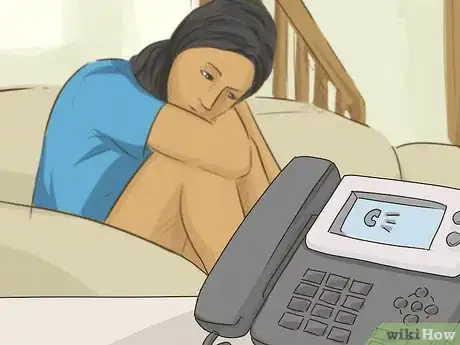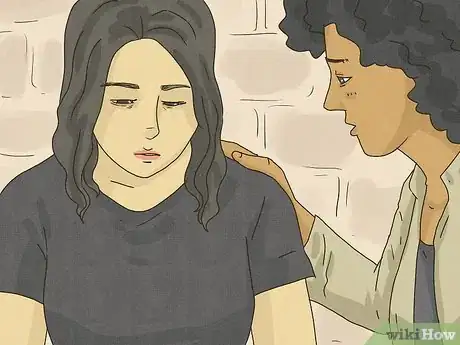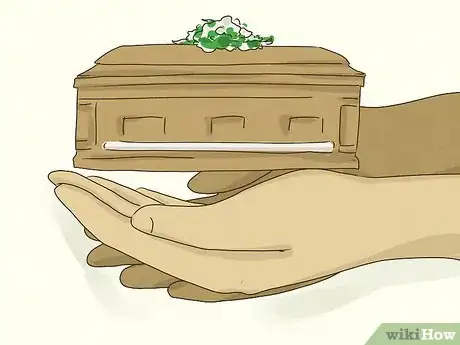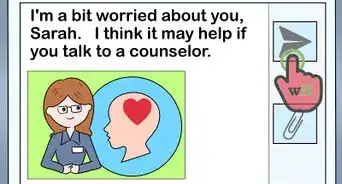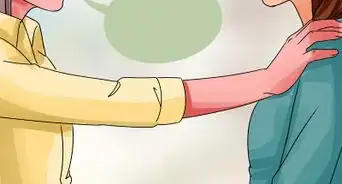This article was co-authored by Ken Breniman, LCSW, C-IAYT and by wikiHow staff writer, Hannah Madden. Ken Breniman is a Licensed Clinical Social Worker, Certified Yoga Therapist and Thanatologist based in the San Francisco Bay Area. Ken has over 15 years experience of providing clinical support and community workshops utilizing a dynamic combination of traditional psychotherapy and yoga therapy. He specializes in eclectic non-denominational yoga guidance, grief therapy, complex trauma recovery and mindful mortal skills development. He has a MSW from Washington University in St. Louis and an MA Certification in Thanatology from Marian University of Fond du Lac. He became certified with the International Association of Yoga Therapists after completing his 500 training hours at Yoga Tree in San Francisco and Ananda Seva Mission in Santa Rosa, CA.
This article has been viewed 33,720 times.
Comforting a friend who’s just experienced a loss can be difficult—it’s hard to know what to say or do without overstepping your boundaries. However, now is the time to let your friend know that you’re here for them, no matter what. By keeping a few guidelines in mind, you can give your friend the support they need as they get through this tough time.
Steps
Conversation
-
1Reach out to your friend. If your friend is grieving, they may not feel comfortable reaching out to you first. Give them a phone call, send them a text, or stop by their home to see if they need anything.[1]
- People who experience a loss sometimes feel like a burden on their friends and family members. By reaching out first, you’re already telling your friend that you’re there for them no matter what.
-
2Give them space if they need it. If you reach out to your friend and they don’t want to talk, try not to be offended. Everyone grieves differently, and your friend might need some time before talking to anyone.[2]
- The important thing is to keep reaching out, even if your friend declines multiple times. Try contacting them every week or so just to check in, even if they don’t want to talk for long.
Advertisement -
3Acknowledge what happened. Often, people try to beat around the bush when someone suffers a loss. Instead, approach your friend by saying you know what happened and how tragic it was.[3]
- You could say something as simple as, “I heard that your father died. I’m so sorry.” This shows that you know what’s going on so your friend doesn’t have to explain it.
-
4Ask how they’re feeling. Try not to assume you know what your friend is going through. Instead, ask them how they’re really doing and what kinds of emotions they’re experiencing.[4]
- Say something like, “How have you been doing? I know this hasn’t been easy.”
-
5Reassure your friend that what they’re going through is normal. People who are grieving can sometimes feel like they’re not processing things correctly or that they have to act a certain way.[5] Make sure your friend knows that they’re not alone in their feelings, thoughts, or actions.[6]
- The 5 stages of grief are denial, guilt, anger, depression, and acceptance. You may see your friend go through all of these, go through none of them, or cycle between a few of them.
-
6Talk about the person who passed away. If you have any fond memories about the person who has passed, share them with your friend. If you didn’t know the person, ask your friend to share their own fond memories.[7]
- People are often scared to talk about someone once they’ve passed away. However, sharing cherished memories can be very cathartic, and may help your friend through the grieving process.
-
7Listen and reassure your friend as they talk. As you talk with your friend, make sure you’re really listening and understanding what they’re saying. If you aren’t sure what to say, just tell them that you’re there for them and will help in any way that you can.[8]
- Say things like, “This must be a really hard time for you. I admire your strength.” Or, “I’m so sorry this is happening to you.”
- If you aren't sure what to say to your friend, try something like, “I’m not sure what to say to that, but I want you to know that I’m here for you.”
- Stay away from platitudes like “They’re in a better place now” or “It’s all a part of God’s plan.” These probably won’t make your friend feel better, and they don’t show that you’ve been listening.
-
8Focus on your friend, not on yourself. Sharing your own experience with loss can be helpful to a certain extent, but try not to talk about yourself too much. Be there for your friend if they need to talk instead of filling the silence with your own thoughts or emotions.[9]
- You may even need to just sit in silence with your friend if they don’t feel like talking. Sometimes, just being around someone else is comforting enough.
Logistics and Support
-
1Assist them with funeral arrangements if you need to. If your friend lost a loved one, they may need to arrange a funeral and burial. If you can, try to handle the logistics as much as possible so your friend can focus on their emotions instead.[10]
- If the person who passed left a will, they may have specific requests for their funeral or burial service.
-
2Ask your friend if they need help with chores or errands. Picking up groceries, taking the kids to school, and cleaning the house are all things that might seem difficult for your friend. If you can, offer your support by taking on some of these responsibilities.[11]
- Bringing your friend a meal is a great way to make sure they’re eating enough.
-
3Distract them with lunch, a walk, or a movie. Your friend might need a little bit of downtime to get out of their own head. Try going for a walk in nature, grabbing a bite to eat, or watching a funny movie.[12]
- Your friend might not be interested in doing something fun, which is okay too. Listen to them and respect their wishes.
-
4Remind them to practice self care. Gently remind your friend about the importance of eating, sleeping, and bathing. Tell them to take a bubble bath, drink a cup of warm tea, or relax by listening to soothing music.[13]
- This can be tough for your friend, especially if the loss is fairly recent. Don’t hound your friend about doing something relaxing if they don’t want to.
-
5Contact your friend on days that might be difficult for them. Birthdays, anniversaries, holidays, and family milestones can all open up old wounds and make your friend feel grief again. If you know a day like this is coming up, prepare to be there for your friend if they need extra support.[14]
- Everyone is different, and your friend might want to be left alone on important dates. Let them know that you’re there for them, but don’t push their boundaries.
-
6Be patient and let your friend grieve as long as they need to. There’s no timeline for how long someone will grieve, and it could be months or even years before your friend feels like themselves again.[15] Let your friend know that you’ll be there for them no matter what, even if they need help long-term.[16]
- People may also feel better and then dip back down into grief again, so it could be a winding road.
-
7Help them talk to a mental health professional if they need to. Grief can be hard to deal with, and your friend might need professional help. If they’re showing signs of depression or mental illness, help them contact a grief counselor.[17]
- Contact emergency services right away if your friend is talking about suicide or self-harm.
Expert Q&A
-
QuestionWhat suggestions can I give my friend if they're looking for grieving strategies?
 Ken Breniman, LCSW, C-IAYTKen Breniman is a Licensed Clinical Social Worker, Certified Yoga Therapist and Thanatologist based in the San Francisco Bay Area. Ken has over 15 years experience of providing clinical support and community workshops utilizing a dynamic combination of traditional psychotherapy and yoga therapy. He specializes in eclectic non-denominational yoga guidance, grief therapy, complex trauma recovery and mindful mortal skills development. He has a MSW from Washington University in St. Louis and an MA Certification in Thanatology from Marian University of Fond du Lac. He became certified with the International Association of Yoga Therapists after completing his 500 training hours at Yoga Tree in San Francisco and Ananda Seva Mission in Santa Rosa, CA.
Ken Breniman, LCSW, C-IAYTKen Breniman is a Licensed Clinical Social Worker, Certified Yoga Therapist and Thanatologist based in the San Francisco Bay Area. Ken has over 15 years experience of providing clinical support and community workshops utilizing a dynamic combination of traditional psychotherapy and yoga therapy. He specializes in eclectic non-denominational yoga guidance, grief therapy, complex trauma recovery and mindful mortal skills development. He has a MSW from Washington University in St. Louis and an MA Certification in Thanatology from Marian University of Fond du Lac. He became certified with the International Association of Yoga Therapists after completing his 500 training hours at Yoga Tree in San Francisco and Ananda Seva Mission in Santa Rosa, CA.
Licensed Clinical Social Worker & Certified Yoga Therapist You could encourage them to engage in some kind of mindfulness. Guided meditation is a good one; you could encourage them to download Headspace or something like that. You could also encourage them to try yoga or something like that. If they're really struggling, encourage them to go therapy or seek counseling.
You could encourage them to engage in some kind of mindfulness. Guided meditation is a good one; you could encourage them to download Headspace or something like that. You could also encourage them to try yoga or something like that. If they're really struggling, encourage them to go therapy or seek counseling. -
QuestionWhy is death so hard?
 Ken Breniman, LCSW, C-IAYTKen Breniman is a Licensed Clinical Social Worker, Certified Yoga Therapist and Thanatologist based in the San Francisco Bay Area. Ken has over 15 years experience of providing clinical support and community workshops utilizing a dynamic combination of traditional psychotherapy and yoga therapy. He specializes in eclectic non-denominational yoga guidance, grief therapy, complex trauma recovery and mindful mortal skills development. He has a MSW from Washington University in St. Louis and an MA Certification in Thanatology from Marian University of Fond du Lac. He became certified with the International Association of Yoga Therapists after completing his 500 training hours at Yoga Tree in San Francisco and Ananda Seva Mission in Santa Rosa, CA.
Ken Breniman, LCSW, C-IAYTKen Breniman is a Licensed Clinical Social Worker, Certified Yoga Therapist and Thanatologist based in the San Francisco Bay Area. Ken has over 15 years experience of providing clinical support and community workshops utilizing a dynamic combination of traditional psychotherapy and yoga therapy. He specializes in eclectic non-denominational yoga guidance, grief therapy, complex trauma recovery and mindful mortal skills development. He has a MSW from Washington University in St. Louis and an MA Certification in Thanatology from Marian University of Fond du Lac. He became certified with the International Association of Yoga Therapists after completing his 500 training hours at Yoga Tree in San Francisco and Ananda Seva Mission in Santa Rosa, CA.
Licensed Clinical Social Worker & Certified Yoga Therapist A lot of this is cultural. We live in a very death avoidant society. The other component is that death is so mysterious in a lot of ways, and we aren't used to not having someone we care about not be there. It's just hard to process all of that.
A lot of this is cultural. We live in a very death avoidant society. The other component is that death is so mysterious in a lot of ways, and we aren't used to not having someone we care about not be there. It's just hard to process all of that. -
QuestionShould I talk to my friend about their loss?
 Ken Breniman, LCSW, C-IAYTKen Breniman is a Licensed Clinical Social Worker, Certified Yoga Therapist and Thanatologist based in the San Francisco Bay Area. Ken has over 15 years experience of providing clinical support and community workshops utilizing a dynamic combination of traditional psychotherapy and yoga therapy. He specializes in eclectic non-denominational yoga guidance, grief therapy, complex trauma recovery and mindful mortal skills development. He has a MSW from Washington University in St. Louis and an MA Certification in Thanatology from Marian University of Fond du Lac. He became certified with the International Association of Yoga Therapists after completing his 500 training hours at Yoga Tree in San Francisco and Ananda Seva Mission in Santa Rosa, CA.
Ken Breniman, LCSW, C-IAYTKen Breniman is a Licensed Clinical Social Worker, Certified Yoga Therapist and Thanatologist based in the San Francisco Bay Area. Ken has over 15 years experience of providing clinical support and community workshops utilizing a dynamic combination of traditional psychotherapy and yoga therapy. He specializes in eclectic non-denominational yoga guidance, grief therapy, complex trauma recovery and mindful mortal skills development. He has a MSW from Washington University in St. Louis and an MA Certification in Thanatology from Marian University of Fond du Lac. He became certified with the International Association of Yoga Therapists after completing his 500 training hours at Yoga Tree in San Francisco and Ananda Seva Mission in Santa Rosa, CA.
Licensed Clinical Social Worker & Certified Yoga Therapist Yes, but don't worry so much about stepping on eggshells or giving the world's most meaningful speech. A lot of this is just about the gesture. If they're resistant or they don't want to talk about it, then just let it go. People need space to process sometimes, and there's nothing wrong with that.
Yes, but don't worry so much about stepping on eggshells or giving the world's most meaningful speech. A lot of this is just about the gesture. If they're resistant or they don't want to talk about it, then just let it go. People need space to process sometimes, and there's nothing wrong with that.
References
- ↑ https://headspace.org.au/friends-and-family/understanding-grief-and-loss-for-family-and-friends/
- ↑ https://www.helpguide.org/articles/grief/helping-someone-who-is-grieving.htm
- ↑ https://www.helpguide.org/articles/grief/helping-someone-who-is-grieving.htm
- ↑ https://www.mentalhealth.gov/talk/friends-family-members
- ↑ Ken Breniman, LCSW, C-IAYT. Licensed Clinical Social Worker. Expert Interview. 24 April 2020.
- ↑ https://afsp.org/story/10-ways-to-support-a-loved-one-who-has-lost-someone-to-suicide
- ↑ https://www.mind.org.uk/information-support/guides-to-support-and-services/bereavement/for-friends-and-family/
- ↑ https://www.helpguide.org/articles/grief/helping-someone-who-is-grieving.htm
- ↑ https://www.mind.org.uk/information-support/guides-to-support-and-services/bereavement/for-friends-and-family/
- ↑ https://www.helpguide.org/articles/grief/helping-someone-who-is-grieving.htm
- ↑ https://headspace.org.au/friends-and-family/understanding-grief-and-loss-for-family-and-friends/
- ↑ https://headspace.org.au/friends-and-family/understanding-grief-and-loss-for-family-and-friends/
- ↑ https://www.helpguide.org/articles/grief/helping-someone-who-is-grieving.htm
- ↑ https://headspace.org.au/friends-and-family/understanding-grief-and-loss-for-family-and-friends/
- ↑ Ken Breniman, LCSW, C-IAYT. Licensed Clinical Social Worker. Expert Interview. 24 April 2020.
- ↑ https://www.helpguide.org/articles/grief/helping-someone-who-is-grieving.htm
- ↑ https://afsp.org/story/10-ways-to-support-a-loved-one-who-has-lost-someone-to-suicide
- ↑ Ken Breniman, LCSW, C-IAYT. Licensed Clinical Social Worker. Expert Interview. 24 April 2020.

